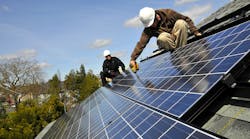Solar Is on a Roll—and Needs More Sunlight from Washington
Opinion/Analysis
China has made clear its goal of dominating critical technologies, including renewable energy, semiconductors, and robotics. This poses a serious threat to U.S. leadership, industries, and jobs. When it comes to the solar power industry and the thousands of good-paying American jobs it supports, lawmakers and the Biden administration must take decisive action.
The U.S. market for solar panels continues to grow, and 29 states are already pursuing renewable portfolio standards that require the increased deployment of solar systems and other green technologies. However, Chinese manufacturers hold a dominant, near-monopoly position in key sectors of the upstream solar supply chain. China also continues to heavily subsidize its solar industry, expanding its market share even further as Beijing pursues global dominance.
China’s chokehold over the global solar supply chain threatens not just U.S. jobs and manufacturing capacity, but also America’s energy independence and technological leadership. It also threatens our national security.
Polysilicon is the key raw material needed for both the solar and semiconductor industry. Semiconductors are the essential “brains” that control our weapons systems and military aircraft like the F-35. China understands the synergies between solar power and semiconductors—and we must acknowledge it too.
As we move towards dependence on renewable energy, it would be a tragedy if the United States ends up dependent on China, a rival global power and a Communist dictatorship, for this vital resource. Fortunately, we’ve made some recent progress, clawing back significant market share in solar module production. A new report released by my organization titled, “Reclaiming the US Solar Supply Chain from China,” documents how the U.S. solar manufacturing sector has regained market share. It also provides a roadmap for building an end-to-end U.S. solar supply chain.
As our report shows, the Section 201 safeguard solar tariffs levied by the Trump administration in 2018 helped the U.S. solar module industry reach new highs in production and market share. In fact, solar installations in the U.S. grew by 43 percent in 2020, to 16.5 gigawatts, an all-time high.
Additionally, several U.S. solar module manufacturers ramped up production substantially in the last three years under the stimulus of the tariffs. In 2019, U.S. producers achieved a 10-year high in market share of 19.8 percent.
To ensure the U.S. solar industry continues to thrive, policymakers should enact a made-in-USA tax credit for U.S.-based solar manufacturers. The tax credit would be linked to the amount of value-added and the level of sales for each company. Washington should also double down on “Buy American” policy, ensuring that the federal government not only buys American-made solar modules, but that it also buys power produced from U.S.-made solar modules.
Importantly, these policies must be reinforced with extended tariffs covering the entire supply chain to enable domestic industry to grow into a complete, end-to-end solar supply chain.
Congress should also increase investment in renewable research and development as well as STEM education. America leads the world in disruptive innovation, and the fundamental driver of our technological progress is the quality of our scientists, engineers, and students. Achieving the carbon-free, low-cost energy future we all want to see is dependent on continued U.S. innovation in solar and related industries.
Failing to address China’s dominance of the solar industry also has severe moral and ethical consequences. China’s use of forced labor in Xinjiang province is an important factor in China’s ability to sell solar power equipment below free-market cost.
The choice now facing the Biden administration is simple: seize the opportunity to Build Back Better and support the continued growth of the U.S. solar supply chain or allow China’s dominance and use of forced labor to continue unfettered.
Renewable energy is too important an industry to allow one hostile, autocratic nation to monopolize the supply of the equipment to produce this vital resource.
Jeff Ferry is the Chief Economist for the Coalition for a Prosperous America. Twitter: @menloferry



